
Publications
Project Papers
-
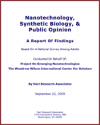 September 29, 2009
Nanotechnology, Synthetic Biology, & Public Opinion
A Report Of Findings Based On A National Survey Among Adults
A groundbreaking poll of 1,001 U.S. adults conducted by Peter D. Hart Research Associates and the Project on Emerging Nanotechnologies (PEN) found 90 percent of Americans think that the public should be better informed about the development of cutting-edge technologies.
Peter D. Hart Research Associates, Inc.
September 29, 2009
Nanotechnology, Synthetic Biology, & Public Opinion
A Report Of Findings Based On A National Survey Among Adults
A groundbreaking poll of 1,001 U.S. adults conducted by Peter D. Hart Research Associates and the Project on Emerging Nanotechnologies (PEN) found 90 percent of Americans think that the public should be better informed about the development of cutting-edge technologies.
Peter D. Hart Research Associates, Inc.
-
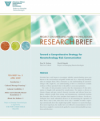 April 6, 2009
Toward a Comprehensive Strategy for Nanotechnology Risk Communication
Cultural Cognition and Nanotechnology Risk Perceptions
The last in a trio of studies: Cultural Cognition and Nanotechnology Risk Perceptions: An Experimental Investigation of Message Framing, asks what science will reveal about the risks and benefits of nanotechnology and what conclusions members of the public will form? It takes an in depth look at the power of information framing to accentuate or mitigate cultural polarization.
Dan M. Kahan, David Rejeski
April 6, 2009
Toward a Comprehensive Strategy for Nanotechnology Risk Communication
Cultural Cognition and Nanotechnology Risk Perceptions
The last in a trio of studies: Cultural Cognition and Nanotechnology Risk Perceptions: An Experimental Investigation of Message Framing, asks what science will reveal about the risks and benefits of nanotechnology and what conclusions members of the public will form? It takes an in depth look at the power of information framing to accentuate or mitigate cultural polarization.
Dan M. Kahan, David Rejeski
-
 December 9, 2008
Federal Government Nanotechnology Environment, Health and Safety Research
Near-term Annual Funding Options
Federal risk-research funding options for moving forward under the next administration
December 9, 2008
Federal Government Nanotechnology Environment, Health and Safety Research
Near-term Annual Funding Options
Federal risk-research funding options for moving forward under the next administration
-
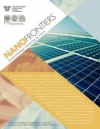 October 3, 2008
Nanotechnology: Energizing the Future
Nanofrontiers Newsletter Fall 2008
Industry and government are searching for new technologies that will foster more efficient and less-polluting energy sources. From nano-enabled solar panels to long-lasting automobile batteries, nanotechnology will be a cornerstone of 21st Century energy sources.
Jason Ortego
October 3, 2008
Nanotechnology: Energizing the Future
Nanofrontiers Newsletter Fall 2008
Industry and government are searching for new technologies that will foster more efficient and less-polluting energy sources. From nano-enabled solar panels to long-lasting automobile batteries, nanotechnology will be a cornerstone of 21st Century energy sources.
Jason Ortego
-
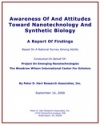 September 18, 2008
Poll: Risks and Benefits of Nanotechnology & Synthetic Biology
A Report of Findings, Based On A National Survey Among Adults
A groundbreaking poll finds that almost half of U.S. adults have heard nothing about nanotechnology, and nearly nine in 10 Americans say they have heard just a little or nothing at all about the emerging field of synthetic biology, according to a new report released by the Project and Peter D. Hart Research. Both technologies involve manipulating matter at an incredibly small scale to achieve something new.
Peter D. Hart Research Associates, Inc.
September 18, 2008
Poll: Risks and Benefits of Nanotechnology & Synthetic Biology
A Report of Findings, Based On A National Survey Among Adults
A groundbreaking poll finds that almost half of U.S. adults have heard nothing about nanotechnology, and nearly nine in 10 Americans say they have heard just a little or nothing at all about the emerging field of synthetic biology, according to a new report released by the Project and Peter D. Hart Research. Both technologies involve manipulating matter at an incredibly small scale to achieve something new.
Peter D. Hart Research Associates, Inc.
-
 May 1, 2008
How to Reduce Your Firm’s Risk and Increase Revenues Related to Nanotechnology
An 8-Step Program for Small Firms
With limited time and resources, how can your firm start to think about or expand on its environmental, health, and safety (EHS) practices related to the use of nanomaterials? This pamphlet presents eight suggestions to assist nano firms in addressing EHS issues associated with the production and use of nanomaterials.
Deanna Lekas
May 1, 2008
How to Reduce Your Firm’s Risk and Increase Revenues Related to Nanotechnology
An 8-Step Program for Small Firms
With limited time and resources, how can your firm start to think about or expand on its environmental, health, and safety (EHS) practices related to the use of nanomaterials? This pamphlet presents eight suggestions to assist nano firms in addressing EHS issues associated with the production and use of nanomaterials.
Deanna Lekas
-
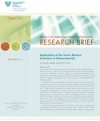 February 26, 2008
Application of the Toxics Release Inventory to Nanomaterials
PEN Brief No. 2
This research brief examines whether the legal authorities that establish the Toxics Release Inventory (TRI) in the Emergency Planning and Community-Right to-Know Act (EPCRA) could be applied to nanomaterials. Although several organizations have published analyses of whether specific environmental laws could be used to regulate nanomaterials, none of these reviews has examined EPCRA or TRI in any detail.
Linda K. Breggin and Read D. Porter
February 26, 2008
Application of the Toxics Release Inventory to Nanomaterials
PEN Brief No. 2
This research brief examines whether the legal authorities that establish the Toxics Release Inventory (TRI) in the Emergency Planning and Community-Right to-Know Act (EPCRA) could be applied to nanomaterials. Although several organizations have published analyses of whether specific environmental laws could be used to regulate nanomaterials, none of these reviews has examined EPCRA or TRI in any detail.
Linda K. Breggin and Read D. Porter
-
 February 19, 2008
Applying the Chemical Policy Options to Emerging Technologies and Materials: Adaptations and Challenges
Can the template developed in this report for chemicals policy reform be applied in assessing the hazards of emerging technologies and what considerations are involved for state governments?
Steffen Foss Hansen and David Rejeski
February 19, 2008
Applying the Chemical Policy Options to Emerging Technologies and Materials: Adaptations and Challenges
Can the template developed in this report for chemicals policy reform be applied in assessing the hazards of emerging technologies and what considerations are involved for state governments?
Steffen Foss Hansen and David Rejeski
-
 February 15, 2008
Nanotechnology Field Observations: Scouting the New Industrial West
“Note from the Field” article for the Journal of Cleaner Production.
David Rejeski, Deanna Lekas
February 15, 2008
Nanotechnology Field Observations: Scouting the New Industrial West
“Note from the Field” article for the Journal of Cleaner Production.
David Rejeski, Deanna Lekas
-
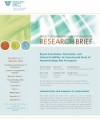 February 4, 2008
Biased Assimilation, Polarization, and Cultural Credibility: An Experimental Study of Nanotechnology Risk Perceptions
PEN Brief No. 3
When the public considers competing arguments about a new technology’s potential risks and benefits, people will tend to agree with the expert whose values are closest to their own, no matter what position the expert takes. According to this study, the same will hold true for nanotechnology.
Dan M. Kahan, Paul Slovic, Donald Braman, John Gastil, Geoffrey Cohen, Douglas Kysar
February 4, 2008
Biased Assimilation, Polarization, and Cultural Credibility: An Experimental Study of Nanotechnology Risk Perceptions
PEN Brief No. 3
When the public considers competing arguments about a new technology’s potential risks and benefits, people will tend to agree with the expert whose values are closest to their own, no matter what position the expert takes. According to this study, the same will hold true for nanotechnology.
Dan M. Kahan, Paul Slovic, Donald Braman, John Gastil, Geoffrey Cohen, Douglas Kysar
 September 29, 2009
Nanotechnology, Synthetic Biology, & Public Opinion
A Report Of Findings Based On A National Survey Among Adults
A groundbreaking poll of 1,001 U.S. adults conducted by Peter D. Hart Research Associates and the Project on Emerging Nanotechnologies (PEN) found 90 percent of Americans think that the public should be better informed about the development of cutting-edge technologies.
September 29, 2009
Nanotechnology, Synthetic Biology, & Public Opinion
A Report Of Findings Based On A National Survey Among Adults
A groundbreaking poll of 1,001 U.S. adults conducted by Peter D. Hart Research Associates and the Project on Emerging Nanotechnologies (PEN) found 90 percent of Americans think that the public should be better informed about the development of cutting-edge technologies.
 April 6, 2009
Toward a Comprehensive Strategy for Nanotechnology Risk Communication
Cultural Cognition and Nanotechnology Risk Perceptions
The last in a trio of studies: Cultural Cognition and Nanotechnology Risk Perceptions: An Experimental Investigation of Message Framing, asks what science will reveal about the risks and benefits of nanotechnology and what conclusions members of the public will form? It takes an in depth look at the power of information framing to accentuate or mitigate cultural polarization.
April 6, 2009
Toward a Comprehensive Strategy for Nanotechnology Risk Communication
Cultural Cognition and Nanotechnology Risk Perceptions
The last in a trio of studies: Cultural Cognition and Nanotechnology Risk Perceptions: An Experimental Investigation of Message Framing, asks what science will reveal about the risks and benefits of nanotechnology and what conclusions members of the public will form? It takes an in depth look at the power of information framing to accentuate or mitigate cultural polarization.
 December 9, 2008
Federal Government Nanotechnology Environment, Health and Safety Research
Near-term Annual Funding Options
Federal risk-research funding options for moving forward under the next administration
December 9, 2008
Federal Government Nanotechnology Environment, Health and Safety Research
Near-term Annual Funding Options
Federal risk-research funding options for moving forward under the next administration
 October 3, 2008
Nanotechnology: Energizing the Future
Nanofrontiers Newsletter Fall 2008
Industry and government are searching for new technologies that will foster more efficient and less-polluting energy sources. From nano-enabled solar panels to long-lasting automobile batteries, nanotechnology will be a cornerstone of 21st Century energy sources.
October 3, 2008
Nanotechnology: Energizing the Future
Nanofrontiers Newsletter Fall 2008
Industry and government are searching for new technologies that will foster more efficient and less-polluting energy sources. From nano-enabled solar panels to long-lasting automobile batteries, nanotechnology will be a cornerstone of 21st Century energy sources.
 September 18, 2008
Poll: Risks and Benefits of Nanotechnology & Synthetic Biology
A Report of Findings, Based On A National Survey Among Adults
A groundbreaking poll finds that almost half of U.S. adults have heard nothing about nanotechnology, and nearly nine in 10 Americans say they have heard just a little or nothing at all about the emerging field of synthetic biology, according to a new report released by the Project and Peter D. Hart Research. Both technologies involve manipulating matter at an incredibly small scale to achieve something new.
September 18, 2008
Poll: Risks and Benefits of Nanotechnology & Synthetic Biology
A Report of Findings, Based On A National Survey Among Adults
A groundbreaking poll finds that almost half of U.S. adults have heard nothing about nanotechnology, and nearly nine in 10 Americans say they have heard just a little or nothing at all about the emerging field of synthetic biology, according to a new report released by the Project and Peter D. Hart Research. Both technologies involve manipulating matter at an incredibly small scale to achieve something new.
 May 1, 2008
How to Reduce Your Firm’s Risk and Increase Revenues Related to Nanotechnology
An 8-Step Program for Small Firms
With limited time and resources, how can your firm start to think about or expand on its environmental, health, and safety (EHS) practices related to the use of nanomaterials? This pamphlet presents eight suggestions to assist nano firms in addressing EHS issues associated with the production and use of nanomaterials.
May 1, 2008
How to Reduce Your Firm’s Risk and Increase Revenues Related to Nanotechnology
An 8-Step Program for Small Firms
With limited time and resources, how can your firm start to think about or expand on its environmental, health, and safety (EHS) practices related to the use of nanomaterials? This pamphlet presents eight suggestions to assist nano firms in addressing EHS issues associated with the production and use of nanomaterials.
 February 26, 2008
Application of the Toxics Release Inventory to Nanomaterials
PEN Brief No. 2
This research brief examines whether the legal authorities that establish the Toxics Release Inventory (TRI) in the Emergency Planning and Community-Right to-Know Act (EPCRA) could be applied to nanomaterials. Although several organizations have published analyses of whether specific environmental laws could be used to regulate nanomaterials, none of these reviews has examined EPCRA or TRI in any detail.
February 26, 2008
Application of the Toxics Release Inventory to Nanomaterials
PEN Brief No. 2
This research brief examines whether the legal authorities that establish the Toxics Release Inventory (TRI) in the Emergency Planning and Community-Right to-Know Act (EPCRA) could be applied to nanomaterials. Although several organizations have published analyses of whether specific environmental laws could be used to regulate nanomaterials, none of these reviews has examined EPCRA or TRI in any detail.
 February 19, 2008
Applying the Chemical Policy Options to Emerging Technologies and Materials: Adaptations and Challenges
Can the template developed in this report for chemicals policy reform be applied in assessing the hazards of emerging technologies and what considerations are involved for state governments?
February 19, 2008
Applying the Chemical Policy Options to Emerging Technologies and Materials: Adaptations and Challenges
Can the template developed in this report for chemicals policy reform be applied in assessing the hazards of emerging technologies and what considerations are involved for state governments?
 February 15, 2008
Nanotechnology Field Observations: Scouting the New Industrial West
“Note from the Field” article for the Journal of Cleaner Production.
February 15, 2008
Nanotechnology Field Observations: Scouting the New Industrial West
“Note from the Field” article for the Journal of Cleaner Production.
 February 4, 2008
Biased Assimilation, Polarization, and Cultural Credibility: An Experimental Study of Nanotechnology Risk Perceptions
PEN Brief No. 3
When the public considers competing arguments about a new technology’s potential risks and benefits, people will tend to agree with the expert whose values are closest to their own, no matter what position the expert takes. According to this study, the same will hold true for nanotechnology.
February 4, 2008
Biased Assimilation, Polarization, and Cultural Credibility: An Experimental Study of Nanotechnology Risk Perceptions
PEN Brief No. 3
When the public considers competing arguments about a new technology’s potential risks and benefits, people will tend to agree with the expert whose values are closest to their own, no matter what position the expert takes. According to this study, the same will hold true for nanotechnology.

